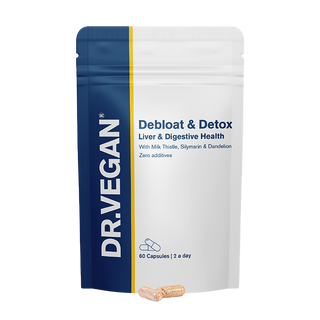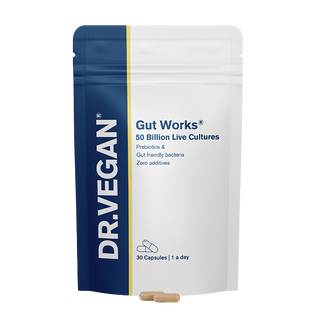5 common myths of coeliac disease

Did you know that 1 in 100 people in the UK have coeliac disease? This means it's quite likely you'll know someone who has been diagnosed with coeliac disease, or is struggling with unexplained symptoms.
There are lots of myths and misunderstandings about coeliac disease. Our experts explain the causes of coeliac disease, the signs and symptoms of coeliac disease, what foods you can eat as a coeliac and 5 common myths of coeliac disease.
Myth 1
‘Coeliac disease is a gluten allergy or gluten intolerance.’
Coeliac disease is not a just a food allergy or gluten intolerance, it is an auto-immune disease.
With coeliac disease, when any food containing gluten is ingested, a response is triggered causing your body’s immune system to attack its own tissues. This results in damage to the delicate lining of the small intestine, meaning the body is unable to absorb nutrients properly from food which can lead to fatigue, anaemia, and weight loss.
Individuals who have the coeliac disease have to avoid all foods containing gluten. Gluten is a protein found in three types of grain - wheat, rye and barley. Gluten is found in any food that contains these grains and commonly includes pasta, breakfast cereals, most types of bread, certain sauces as well as most beers.
Similar proteins are found in oats but are not thought to be harmful to the majority of coeliacs. Pure, uncontaminated oats are usually safe for most coeliacs to eat but others may not be able to tolerate them at all so it is best to choose gluten-free oats.
Always check food labels for ingredients containing gluten. If you’re not sure if you have coeliac disease, read about the ‘signs of gluten intolerance’.
Myth 2
‘You must have gastrointestinal symptoms such as diarrhoea and bloating to have coeliac disease.’
Not true. Traditionally coeliac disease has been associated with gastrointestinal symptoms such as diarrhoea, bloating, cramping, nausea, vomiting and stomach pain. However, you do not need to have digestive or gut symptoms to have coeliac disease.
Eating foods that contain gluten can trigger a range of symptoms outside of the gut such as unexplained weight loss, headaches and migraines, recurrent mouth ulcers, fatigue, iron deficiency anaemia, nutritional deficiencies, skin rashes, tooth enamel issues along with many others. The severity and type of symptoms can vary from person to person, and some coeliacs having no symptoms at all, however, damage to the gut will still occur when gluten is eaten.
Learn more in 'The reasons you might be bloated'.
Myth 3
'Only children are diagnosed with coeliac disease'.
This is most certainly not true. Coeliac disease can develop and be diagnosed at any stage of life, affecting all age groups. The average age of diagnosis for coeliac disease is between the age of 40-60 years, with women more likely to be diagnosed than men. People with certain auto-immune conditions such as Type 1 diabetes and thyroid conditions are more likely to develop coeliac disease.

Discover our delicious Tomato and Red Pepper Soup Recipe.
For those wondering if coeliac disease is hereditary - there is also a genetic component for the disease and the risk increases 10x to 1 in 10 if you have a close relative with the condition.
Myth 4
‘Eating a little bit of gluten won’t cause any harm to someone with coeliac disease'.
Even very small amounts of gluten, such as a spoonful of pasta or a bit of bread, can cause symptoms and damage to the gut for people with coeliac disease. Unfortunately tolerance to gluten can't be built up so avoiding cross-contamination with gluten is also important. It's also important to ensure that gluten-free food is prepared in a gluten-free environment.
All DR.VEGAN supplements are gluten-free and it's why we always advise #CheckTheLabel on anything you ingest, including all vitamins and supplements. Learn more in 'Check your labels for these ingredients'.
Myth 5
‘You can ‘outgrow’ coeliac disease'.
Coeliac disease is a chronic condition, which is a life-long intolerance to gluten that you do not grow out of. The only treatment is to follow a gluten-free diet for life.
Taking gluten out of the diet allows the gut to heal and should help to control symptoms. If gluten is brought back into the diet at a later stage, the immune system will react and the gut lining will be damaged again.
Learn more in '6 signs of an unhealthy gut'.
Following a lifelong gluten-free diet may seem daunting at first but it does not mean you can’t enjoy food, and the social aspects of food just like everyone else. There has been a rise in the range of gluten-free products available and options in restaurants when eating out, making it much easier to eat a healthy and varied gluten-free diet.
You may also enjoy 'How to look after your gut through your diet'.
Discover our range of vegan and gluten-free vitamins and supplements.
Want to hear more from our nutritionists? Sign up to our email newsletter for insights and exclusive offers:
Complete your free Diet Profile for a window into your diet.
Useful links for help with coeliac disease
- NHS Coeliac Disease (2022) - https://www.nhs.uk/conditions/coeliac-disease/
- Coeliac UK - https://www.coeliac.org.uk/home/
- Gluten-free diet - https://www.coeliac.org.uk/information-and-support/living-gluten-free/the-gluten-free-diet/
References
- NICE guideline [NG20] 2015. Coeliac disease: recognition, assessment and management.
- Ludvigsson et al (2014) Diagnosis and management of adult coeliac disease: guidelines from the British Society of Gastroenterology. Available from https://www.bsg.org.uk/resource/bsg-guidelines-on-the-diagnosis-and-management-of-adult-coeliac-disease.html
- Ciccocioppo R, Di Sabatino A, Corazza GR. The immune recognition of gluten in coeliac disease. Clin Exp Immunol. 2005 Jun;140(3):408-16. DOI: 10.1111/j.1365-2249.2005.02783.x. PMID: 15932501; PMCID: PMC1809391.
- West J, Fleming KM, Tata LJ, Card TR, Crooks CJ. Incidence and prevalence of celiac disease and dermatitis herpetiformis in the UK over two decades: a population-based study. Am J Gastroenterol. 2014 May;109(5):757-68. DOI: 10.1038/ajg.2014.55. Epub 2014 Mar 25. PMID: 24667576; PMCID: PMC4012300.
- Högberg L, Fälth-Magnusson K, Grodzinsky E, Stenhammar L. Familial prevalence of coeliac disease: a twenty-year follow-up study. Scand J Gastroenterol. 2003 Jan;38(1):61-5. DOI: 10.1080/00365520310000456. PMID: 12608466.



















